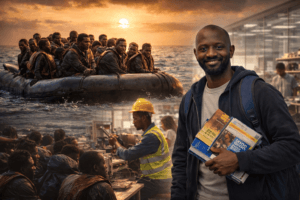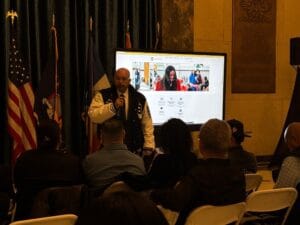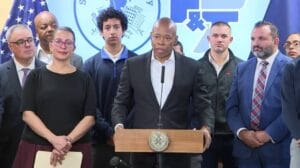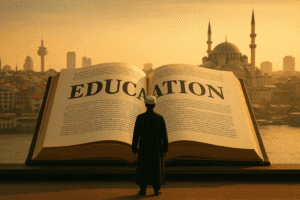A Weaver of Borderless Dreams
He is a maker of dreams for writers – a man who believes in dreams that are woven in words and multimedia across the world. He connects writing with multimedia, not just by writing and YouTube screenings but also by putting upcoming writers on his television show to battle out challenging questions about how literary development affects the world. He looks for writers with a sense of social responsibility and awareness. The extent of his work is huge. Meet this personality extraordinaire — Mutiu Olawuyi…

He is a maker of dreams for writers – a man who believes in dreams that are woven in words and multimedia across the world. He connects writing with multimedia, not just by writing and YouTube but also by putting up-and-coming writers on his television show to battle out challenging questions about how literary development affects the world. He looks for writers with a sense of social responsibility and awareness. The extent of his work is huge. Meet this personality extraordinaire — Mutiu Olawuyi (popularly called the Jungle Poet) an international award-winning poet (2013 World Poetry Empowered Poet Awardee, Canada); Honorary Professor of International Art Academy, Volos Greece; World Poetry Cultural Ambassador (2014, Vancouver – Canada); and Master of Literary Innovation (2019 – World Poetry Conference, Bathinda Punjab, India).
He is the producer and host of ArtFlakes on CBA TV, the Voice of East Africa and he is also the Editor-in-Chief of New York Parrot, Parkchester Times and MCR newspapers (Print and Online) based in New York, USA.

He has authored numerous books of poetry (Among them are American Literary Legends and Other Poems [2010], Thoughts from the Jungle [2012], 9/11 Poetry [2012], and The Journey to the Archangels [2013]) and has edited numerous international anthologies, journals and magazines.
Mutiu is a teacher, English language and literature curriculum developer, freelance writer/editor, literary critic, inventor of a new form of poetry called 9eleven (a poem of 9 lines written with 11 syllables) and the first writer of a story without verb – The Blotted Pawpaw (published 2013 by Bharat College in India). He is also an editor for The Criterion International Journal in English based in India.
Mutiu has some of his poems, short stories and research papers published in online and offline journals and magazines in India, Ireland, England, Canada, Greece, Nigeria and USA. Finally, some of his works have been translated to Arabic, French, Esperantos, Malayalam, Telugu and Hungarian. In this exclusive Mutiu takes us on a journey through his creative world.
Mitali: Why and when did you start ArtFlakes? What is the intent of this program?
Mutiu: ArtFlakes is a TV Show initiated primarily to give voice to creative writers around the globe. It was established to project literary works of art on the screen. I am pleased to say it is the only TV show on earth where global issues are explored through creative and literary lenses of writers across every corner of the world. Moreover, I believe creative works like poetry and prose shouldn’t be restricted to papers and pens alone. Those inkers shouldn’t always be placed behind the camera; they deserve to be projected on the screen too.
Mitali: How did you come up with the idea?
Mutiu: The idea came up when I was brainstorming with the managers of CBA TV on the best way to make the station unique among all its competitors, especially in the Horn of Africa. And it was actually Ridwan Adelaja, a creative member of the media team at the studio, who came up with the name, after hearing the concept.
Mitali: How many writers have you interviewed in Artflakes? What do you see as its future?
Mutiu: The show actually kicked off on air on January 25, 2019 with a review of the literary works of Mohamed Ibrahim Warsame, popularly known as Hadraawi, a renowned Somali colonial and neo-colonial literary activist, who used his poetic prowess to eliminate Siyad Barre from power, and thereafter lyrically called for reconciliation and unity among the Somalis in the region after the civil war that ousted President Barre out of power.
This was co-explored with Abubakar Isiaka Ubaji (aka Eazy), a vibrant unsung Nigerian literary critic and poet. Thereafter, we started using our literary binoculars to explore critical issues in African societies. So we ended up exploring the world of people in Kenya, Ethiopia, Uganda, Djibouti, Republic of Sudan, South Sudan, Malawi, Rwanda, Tanzania, Zambia, Nigeria, Ghana, Senegal, South Africa and Bostwana through the review of works of African writers like Ngugi Wa Thiong’o, Sembene Ousman, Ama Atah Aidoo, Helon Habila, Ifrah Monsour, Gaariye, Nadifa Mohamed, Cristina Ali Farah, Tayeb Salih, Bessie Amelia Head, and many others.
By the end of 2019, I decided to move beyond Africa and change the style of anchoring the show by contacting the creative writers directly, instead of just reviewing their works on the screen with my regular guest, Eazy. So I started with the Greek literary world via an interview with a Greek poet and physicist, Professor Chryssa Velissariou. And so far I have covered the literary world of the United States/New World, India, Philippines, China, Yugoslavia, Indo-Singapore, Sweden, Liberia, and Pak-America by voyaging through the world of authors like Elizabeth Castillo, Bengt O Björklund, Wang Ping, Catherine Zickgraf Christopher Merill, Dustin Pickering, Ibrahim Honjo, Sonnet Mondal, Jernail Singh Anand, Patricia Jabbeh Wesley and of course, Mitali Chakravarty, the borderless Asian poet and literary activist.
Mitali: Don’t embarrass me Mutiu – do not see myself as an activist really. But let us get back to you. You teach. You write. You do television shows twice a week. Where do you find your time and energy?
Mutiu: Everything in life is all about passion. I am an edupreneur, creative writer and freelance journalist/editor – I own a college, serve as a consultant for universities in the areas of curriculum review for ESL (English as Second language) and Journalism, edit three newspapers in New York and teach ESP (English for Specific Purpose) courses at my institute and a postgraduate school of a university in the Horn of Africa. And don’t forget I also manage my college and the two media outlets in the United States, and even support the top management team of the TV station in key managerial decision making. But if you keenly look at all these responsibilities, you’ll notice that they all revolve around my passions – pedagogy, creative writing and modern media. So I always find time from no time to accomplish my missions in these key areas. My creative writings flow spontaneously, by the way.
Mitali: You call yourself a ‘Jungle Poet’. Why?
Mutiu: This is an interesting question. I first answered this question in a book I published in 2011 titled – Thoughts from the Jungle, a poetic presentation of African proverbs. If you interpret Jungle Poet dennotatively, you’ll definitely get it wrong. Anyway, here is my connotative interpretation:
…The world was initially a jungle (i.e. a piece of land [of freedom] without borders) and it will finally end up becoming a jungle. Findings have shown that people who live in the jungle preciously preserve their cultural norms and values, and consequently live a better harmonious and healthy live – compared to people of the urban areas, where manipulation of nature is the order of the day. Connotatively, jungle therefore means “universal”, “aesthetic”, “naturalist” or borderless.
I guess, with this, you can now decode the reason for calling myself Jungle Poet (JP)…
Mitali: You have written on many issues that affect mankind in general, even about violence against women in India. What about women in Africa? Do they face any violence any abuse? How do you see their condition in context of women in other parts of the world?
Mutiu: Yes, I have led several global literary advocacies against gender inequities and violence, and have published several international poetry anthologies on universal peace and love, plus protest against rape and domestic violence. But note that violence of all sorts is a universal issue. It’s not limited to India alone. Rape and other forms of domestic violence are also common in Africa, as they’re common in other Asian world, Mideast, Europe, Australia and America.
It’s true that some women have chosen to die in silence; they bury within themselves the wounds inflicted on them by their male counterparts. However, this abuse has been extensively curtailed in Africa these days, especially with the influence of politically strong African women activists and other activists against gender violence. Most women nowadays are “in-charge”. I mean they are “FULLY in charge”.
In fact, the case is becoming vice versa – some men these days are becoming victims of domestic violence, especially in Nigeria. This is why I personally believe that advocacy for gender equality is like a fairytale, because it’s an impossible dream. True activists fight for gender equity; not gender equality!
Mitali: Africa is where mankind started its journey. Yet we know very less about Africa, the different cultures it houses and your own culture. Educate us a bit about this.
Mutiu: You’re right. Anthropologists will tell you categorically that the journey of mankind started in Africa. It’s a continent with abundant natural resources and diverse cultural norms and values, with numerous socio-linguistic settings. Nigeria alone, for instance, has got over two hundred languages, and of course over two hundred socio-cultural groups, with a population of over two hundred million.
Apart from Ethiopia and Liberia, two countries that didn’t experience colonialism, African cultures started losing their values when they came in contact with the western colonialists, particularly the Britons, French, Portuguese and Italians. Influence of Arab colonialists couldn’t go beyond the Abyssinian territories in the Horn of Africa, whose leaders were major suppliers of slaves to the Arab world.
The assimilation and indirect rule system put in place in West Africa by respective French and British colonialists, who initially disguised with the three B’s (Business, Bible and Bullet) to cajole and conquer African kings, swiftly aided the establishment of the colonialists’ socio-political and economic dominance. And they diplomatically sealed their presence even after the abolition of slave trade and colonialism in the continent. They handed over power to their puppets when leaving Africa and since then, they’ve been major determinants of the socio-economic and political systems in the continent. Our key resources are managed by out imperialists, safeguarded for them by their boot-lickers, our so-called power-drunk leaders.
This long-term dominance has therefore dramatically affected African cultural heritage. It’s pathetically diminishing. Even some African traditional rulers, nowadays, invest heavily in the West, surprisingly with resources gathered indirectly from their subjects. You can see there a serious problem – what do you expect the younger generation to do after seeing their elders still licking the foot of the West? It’s sad to disclose to the borderless literary world that African cultures are dying day by day. Most Africans nowadays now live either an Arab or a Western lifestyle. Most of the youth have proudly lost the understanding of the core aspects of their local languages to foreign tongues. It’s really, really pathetic!
Mitali: You have a huge repertoire of works. Tell us how and when your journey as a writer and creative person started?
Mutiu: I actually started with visual art, because I guess it’s hereditary. No one taught me how to draw, but one thing I knew was that my father was once a visual artist before he became an engineer and university instructor. So I picked up my inbuilt creativity from him since I was 6, and got more into creative writing when I got to high school. And the rest of my formal education pursuits have been in the area of creative writing, media and language pedagogy.
More importantly, my early childhood experience made me a poet, if you understand what I mean. You know, poetry is medicinal; it heals wounds within; wounds that pharmaceutical products can’t cure. But to be candid, I can vividly say I started serious creative writing about 24 years ago, when I realized I couldn’t find other way out to solve my personal domestic challenges… So I resorted to offloading my heavy thoughts poetically on papers.
I have had numerous poetry publications to my credit especially on socio-cultural, political and economic issues like gender violence, socio-economic disparities, culture, peace, love and unity among human race. I have also collaborated with several great and passionate creative minds within Africa and beyond Africa, especially from countries India, England, the United States, Greece, Romania, France, Cyprus and more.
I have co-edited global literary anthologies with passionate creative writing giants and pedagogues like Denise Dee Sweet and Kirsten Hemmy (both from USA), late Madan Yayati Gandhi (India), Chryssa Velissariou (Greece), Sunil Sharma and Jernail Singh Anand (both from India), Stephen Billy Olajide (Nigeria), Kathy Figueroa (Canada), Mario Melendez (Italy), Lucette Bailliet (Australia) and the likes.
Essentially, as an explorer and true creative mind, particularly in the world of English language and literature, I got to a stage in my literary journey where I was no longer satisfied with myself just a poet or short story writer alone; I was tired of following the rules established by so-called renowned writers in the past, so I decided to try my hand in unique literary innovations.
This led to creating in 2011 a new form of poetry called 9eleven (a poem of nine lines written with eleven monosyllabic words), and likewise writing a story without a verb in 2013 called The Blotted Pawpaw, which was first published in the same year in an academic journal in India. I actually initiated the latter to debunk syntacticians like Noam Chomsky and McHalliday who believe that a sentence is incomplete without a verb. Now with my story, we can obviously change the conventional rule of sentence structure from Sentence = (Subject) + Verb + (Object) + (Adjunct/Complement) to Sentence = (Subject) + (Verb) + (Object) + (Adjunct/Complement). Mission accomplished, right? Hahaha…
Note also that I later joined the media fraternity mainly because I was tired of the mainstream media operators, who are paid to report and show to the rest of the world nothing good in my continent Africa and Asia.
I was tired of being misrepresented in paper and on screen. So I realized that my universal peace advocacy will be fruitless without changing the narratives through the media. I found out that everything good is reported about the West in the Western media with global presence, but the reverse is the case when dealing with media reports from Asia and Africa.
Where then is the objectivity in the global ethics of journalism? Who is deceiving who? And you know the worst and most unfortunate part of this is that the key figures in charge of the media in these two continents have been brainwashed to believe that media market is lucrative only when you focus heavily on negative happenings in the society.
The finance report that shows extreme poverty in Congo or Rwanda or health issues and war in Liberia or Seirra Leon, but no finance to cover homelessness and abject poverty in Mississippi, and the Bronx in the United States or even the “mighty” London. This is nonsense! This narrative has to change…
Our people in the media must know the truth – we must fairly project every situation in our society – positive and negative, and be given the chance to see the other side of the so-called developed countries. I am the voice and the true descriptor of myself and I cannot allow anyone to define me. Never! Enough of using media for creating racial, religious, and socio-cultural divisions among human race! We should also know that the same media can be used for creating peace, unity in diversity, and projecting socio-economic realities…
Mitali: What was it like growing up in Nigeria and how far do you think you have journeyed? Where do you see yourself, your show and your writing in the future?
Mutiu: Nigeria is a great nation; a nation of hardworking and entrepreneurial people. I was actually raised in a metropolitan city of Ilorin and spent almost a half of my life there, before relocating to other cities in the south east and south west. In 2009, I became a foreigner in my homeland because I jetted out of the country, and since then, I only returned thrice as a stranger who spent only maximum of three months in his fatherland.
Everything I left had changed completely – both human and materials. The most shocking part of these changes was seeing our young men and women becoming so inferior that they no longer cherished their natural skin – they had opted for body bleaching creams and soaps, all in the name of being “white”. It’s sad, right? So so sad… This is what you get when your school syllabi are designed to suit only “Western” standard; and not indigenous standard. On the other hand, infrastructural development had taken over most cities in Nigeria, except for few places unfortunately handled by greedy politicians.
Anyway, as an ambitious person, I believe in the next couple of years I would have been able to set up independent platforms for unsung creative minds around the world through digital/electronic media. This, I believe, is one of the best ways to speak directly to those in power and the masses. Fair share should be given to creativity as it is given to politics, science and technology through news, shows and documentaries. With my borderless mind, I can easily get it done by collaborating with like-minds in other parts of the globe.
Mitali: How diverse are the cultures in different parts of Africa, within the country and without? Has this influenced your writing?
Mutiu: Africa is a home of cultural diversity with over 1.3 billion people. Research, in fact, shows that the continent has more than 3000 different ethnic groups speaking more than 2000 unrelated languages. Likewise, most Africans practice a multiplicity of religions, including Islam, Christianity, Judaism, Hinduism, and numerous traditional religions attached to individual ethnic group.
This multilingual and multicultural nature of African continent has greatly influenced my writing. For instance as a writer, who has lived in different socio-linguistic settings within the continent, apart from Yoruba, Arabic and English, which are languages I acquired formally, I can proudly say, at least, I have basic understanding of five other African languages, which I use a lot in my poems and short stories. As a borderless writer too, I’m still learning languages like Chinese, Dutch and French for global intelligibility.
Mitali: You have written poetry on Apartheid. Is apartheid still an issue in Africa?
Mutiu: Not really. Apartheid has significantly faded away from Africa. Its remains could only be seen in the areas of gender, and caste/tribe. And they too are fading away gradually. I actually wrote the poem on apartheid to remind our younger generations about past happenings in Africa and its painful effects. This would make them comprehend it as an abomination.
Mitali: In some of the developing countries, we see a yawning gap between the rich and poor. Is that true of Africa too? Does literature in Africa take up these issues?
Mutiu: Every capitalistic society generally has one thing in common – the wide gap between the rich and the poor; the rich becoming richer and the poor becoming poorer. And it’s important to note here that the influence of American and Chinese politico-economic systems in Africa has made this a reality in the continent.
Does literature in Africa take up these issues?I’d say: Of course yes, it does. Some African creative writers like Wole Soyinka, Ngugi Wa Thiong’o, Olu Obafemi, John Pepper Clark, Ama Attah Aidoo, Sembene Ousman, Fatou Juka Jabang, Nana Grey Johnson and the likes are really trying to expose this in their writings. These are leading African literary figure who are tirelessly promoting the preservation of African culture through literature.
Young unsung African poets, playwrights and novelists too like Abubakar Isiaka Ubaji, Abullahi Jatta (The Kunta Kinte), Abubakar Ibrahim, Seun Sokoya, Ridwan Adelaja, Lekpele Nyamalon, Taofeeq Ogunperi, Nii-Ayi Solomon, Robert Ebi, Kinsley Nwadishi, Ndaba Sibanda, Darlignton Njobuewu, Kibrom Habtu, Muizat Kehinde Hameed, Alex O. Edevwie, Timileyin Olajuwon and the likes mostly pour their feelings on socio-economic and political decadence in the continent – perhaps because that’s the reality in their modern individual world.
But as far as I am concerned, I strongly believe in juxtaposition of socio-cultural revitalization and politico-economic revelation in creative writing. Our ideas shouldn’t be caged in one world alone. Creative writers are borderless. We should be able to link the past with the present in order to accurately and creatively capture and proffer solutions to future societal challenges.
Mitali: Is there a large body of African writers writing in English? What are the themes they like to address?
Mutiu: There are several country-based established associations of creative writers in Africa. Some of these are managed by people of academia, so voices of young or old less academic Africans are not really heard there. However, there are also numerous platforms available online (especially social media literary groups) that connect African writers together – regardless of age, academic or socio-economic background. Most African writers nowadays focus their works on socio-political and economic issues like relationship, deception, corruption, poverty and fraud.
Mitali: Have you traveled to all the countries your work has traveled to? Has your travel affected your writing?
Mutiu: As a proud borderless writer with keen interest in universal peace and love, I can only say boldly that I have, of course, traveled physically and digitally to a lot of countries within Africa and beyond. This is why I could write about socio-cultural and economic issues in India, Greece, Canada, the US, the UK, China, Middle East and of course various countries in Africa.
REPRINTED FROM BORDERLESS JOURNAL AND COUNTERCURRENTS.ORG














